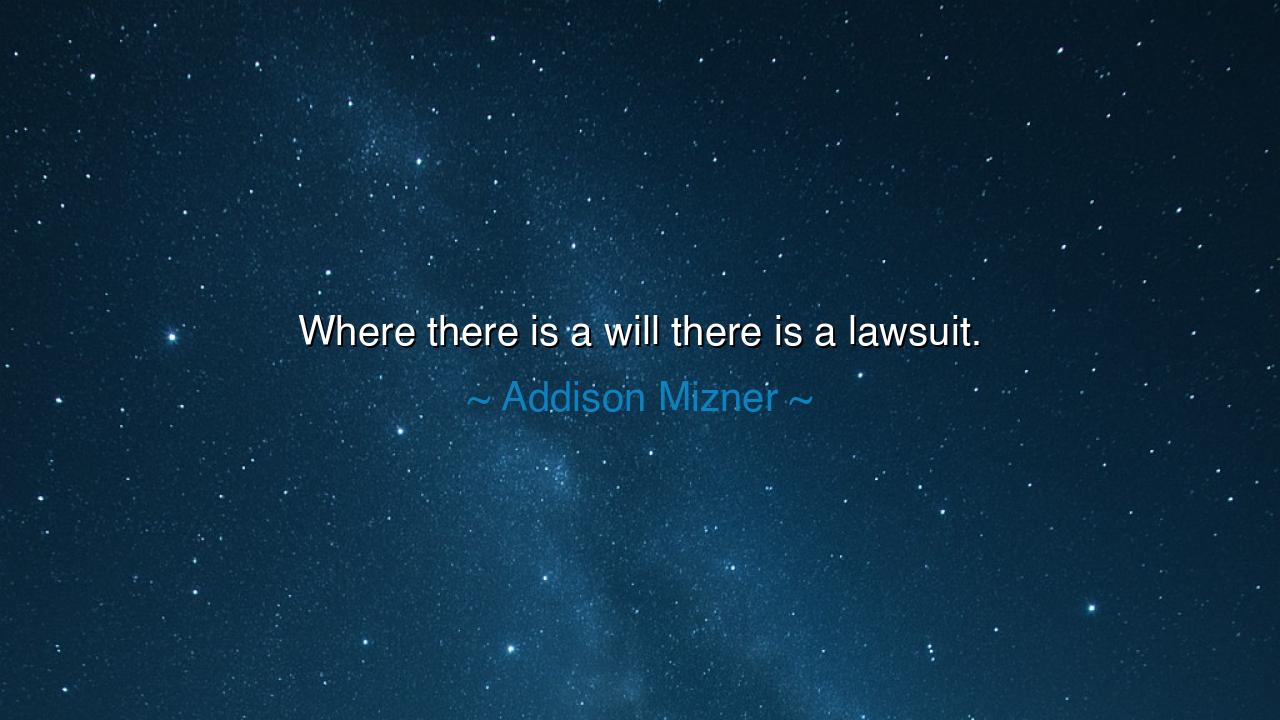
Where there is a will there is a lawsuit.






Hear, O listeners, the sharp and witty words of Addison Mizner, who once declared: “Where there is a will there is a lawsuit.” At first, this phrase plays upon the old proverb, “Where there is a will, there is a way.” Yet Mizner’s twist turns the saying into a lament on human nature: when wealth, inheritance, or the matters of legacy are involved, conflict often follows. For in the shadow of death, when a person’s estate is divided, families who once shared love too often fall into bitterness, suspicion, and greed.
The meaning of this saying is plain, yet profound. A will—that solemn document meant to preserve order, honor last wishes, and provide peace to the bereaved—becomes instead a spark of strife. Brothers turn against sisters, children against parents, cousins against cousins. In the halls of law, the living quarrel over the possessions of the dead. Thus, Mizner teaches us that law itself cannot tame the desires of the human heart, and that no written word, however carefully crafted, can fully prevent discord when wealth is at stake.
The ancients knew this truth as well. The Greeks told of the house of Atreus, where inheritance and kingship led to betrayal, murder, and endless vengeance. The Romans, too, were familiar with lawsuits over estates, for their citizens saw in death not only sorrow but opportunity. Even the Bible recounts a moment when a man cried out to Jesus, “Tell my brother to divide the inheritance with me,” to which the teacher replied: “Take heed and beware of covetousness.” From age to age, the struggle over wills has revealed the same flaw: greed poisons love, and law cannot always heal the wound.
Consider, for a more recent example, the bitter conflicts following the death of Howard Hughes, the reclusive billionaire. With no clear, uncontested will, courts were flooded with claimants, impostors, and distant relatives, each demanding a portion of his fortune. Years of lawsuits ensued, consuming time and treasure, while the man’s wealth, instead of providing security and order, became the very cause of strife. In this, Mizner’s words ring true: “Where there is a will there is a lawsuit.”
Yet the quote is not merely a jest; it is also a warning. It reminds us that the law, though necessary, cannot replace the deeper virtues of harmony, fairness, and open communication within families. To draft a will is wise, but to cultivate unity and clarity while living is wiser still. For the most carefully written document cannot prevent quarrels if envy has already rooted itself in the hearts of heirs. True peace is built not by parchment alone, but by trust, love, and the clear settling of expectations long before death arrives.
The lesson for us, then, is twofold. First, prepare wisely—make provisions, write clearly, ensure that your intentions cannot easily be twisted. But second, and greater, live in such a way that your passing will not ignite conflict among those you love. Speak openly with your family, resolve resentments, and ensure that what you leave behind is not only possessions but also peace.
Therefore, O listener, take Mizner’s sharp wit as a serious counsel. Do not let your legacy be a battlefield. Remember that possessions perish, but love endures. Secure your affairs with wisdom, but greater still, cultivate bonds so strong that no lawsuit could ever break them. For in the end, it is not wealth that proves your way, but the harmony you leave behind.
So let his words echo, half in humor, half in warning: “Where there is a will there is a lawsuit.” May we learn from them, and strive to ensure that when our time comes, our legacy will be one of peace, not quarrel; of unity, not division; of love, not litigation.






AAdministratorAdministrator
Welcome, honored guests. Please leave a comment, we will respond soon